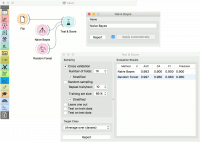Difference between revisions of "Orange: Naive Bayes"
Onnowpurbo (talk | contribs) (Created page with "Sumber: https://docs.biolab.si//3/visual-programming/widgets/model/naivebayes.html A fast and simple probabilistic classifier based on Bayes’ theorem with the assumption...") |
Onnowpurbo (talk | contribs) |
||
| Line 8: | Line 8: | ||
Data: input dataset | Data: input dataset | ||
| − | |||
Preprocessor: preprocessing method(s) | Preprocessor: preprocessing method(s) | ||
| Line 14: | Line 13: | ||
Learner: naive bayes learning algorithm | Learner: naive bayes learning algorithm | ||
| − | |||
Model: trained model | Model: trained model | ||
Naive Bayes learns a Naive Bayesian model from the data. It only works for classification tasks. | Naive Bayes learns a Naive Bayesian model from the data. It only works for classification tasks. | ||
| − | + | [[File:NaiveBayes-stamped.png|center|200px|thumb]] | |
This widget has two options: the name under which it will appear in other widgets and producing a report. The default name is Naive Bayes. When you change it, you need to press Apply. | This widget has two options: the name under which it will appear in other widgets and producing a report. The default name is Naive Bayes. When you change it, you need to press Apply. | ||
| − | + | ||
| + | ==Contoh== | ||
Here, we present two uses of this widget. First, we compare the results of the Naive Bayes with another model, the Random Forest. We connect iris data from File to Test & Score. We also connect Naive Bayes and Random Forest to Test & Score and observe their prediction scores. | Here, we present two uses of this widget. First, we compare the results of the Naive Bayes with another model, the Random Forest. We connect iris data from File to Test & Score. We also connect Naive Bayes and Random Forest to Test & Score and observe their prediction scores. | ||
| − | + | [[File:NaiveBayes-classification.png|center|200px|thumb]] | |
The second schema shows the quality of predictions made with Naive Bayes. We feed the Test & Score widget a Naive Bayes learner and then send the data to the Confusion Matrix. We also connect Scatter Plot with File. Then we select the misclassified instances in the Confusion Matrix and show feed them to Scatter Plot. The bold dots in the scatterplot are the misclassified instances from Naive Bayes. | The second schema shows the quality of predictions made with Naive Bayes. We feed the Test & Score widget a Naive Bayes learner and then send the data to the Confusion Matrix. We also connect Scatter Plot with File. Then we select the misclassified instances in the Confusion Matrix and show feed them to Scatter Plot. The bold dots in the scatterplot are the misclassified instances from Naive Bayes. | ||
| − | + | File:NaiveBayes-visualize.png|center|200px|thumb]] | |
Revision as of 09:53, 23 January 2020
Sumber: https://docs.biolab.si//3/visual-programming/widgets/model/naivebayes.html
A fast and simple probabilistic classifier based on Bayes’ theorem with the assumption of feature independence.
Inputs
Data: input dataset Preprocessor: preprocessing method(s)
Outputs
Learner: naive bayes learning algorithm Model: trained model
Naive Bayes learns a Naive Bayesian model from the data. It only works for classification tasks.
This widget has two options: the name under which it will appear in other widgets and producing a report. The default name is Naive Bayes. When you change it, you need to press Apply.
Contoh
Here, we present two uses of this widget. First, we compare the results of the Naive Bayes with another model, the Random Forest. We connect iris data from File to Test & Score. We also connect Naive Bayes and Random Forest to Test & Score and observe their prediction scores.
The second schema shows the quality of predictions made with Naive Bayes. We feed the Test & Score widget a Naive Bayes learner and then send the data to the Confusion Matrix. We also connect Scatter Plot with File. Then we select the misclassified instances in the Confusion Matrix and show feed them to Scatter Plot. The bold dots in the scatterplot are the misclassified instances from Naive Bayes.
File:NaiveBayes-visualize.png|center|200px|thumb]]

